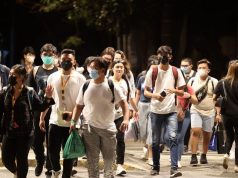
The following is a summary of some recent studies on COVID-19. They include research that warrants further study to corroborate the findings and that has yet to be certified by peer review.
Old cancer diagnosis not linked with worse COVID-19 outcomes
Patients diagnosed with cancer more than a year before contracting COVID-19 and those not receiving active treatment may be no more vulnerable to worse COVID outcomes than those without cancer, according to a new study.
“We found that recent cancer diagnoses were associated with a 17% increased risk for death and 10% increased risk for hospitalization,” said Youngran Kim of UT Health Houston in a statement.
“However, a history of cancer more than one year before COVID-19 diagnosis was not significantly associated with increased mortality or hospitalization.”
Using electronic health records, Kim’s team studied 271,639 U.S. adults diagnosed with COVID-19 between June and December 2020, including more than 10,000 who had been diagnosed with cancer in the past year and roughly 8,000 whose cancer diagnosis had been made more than a year earlier.
As reported in PLOS One, recent cancer diagnoses were associated with higher risks for worse COVID-19 outcomes particularly among people with metastatic disease or cancers of the blood, liver or lungs.
Higher risk for death was also linked to chemotherapy or radiation treatments within three months before SARS-CoV-2 infection.
The study found other disparities among recently-diagnosed cancer patients. In particular, those who were older, Black, received Medicare, and/or lived in the Southern United States were significantly more likely to die after SARS-CoV-2 infection.
Researchers warn of air travel transmission risk
Passengers are still at risk of coronavirus infection while traveling on airplanes and also in airports, researchers warned.
Two passengers taking a 10-hour flight from Dubai to Australia in July 2020 infected 15 other people, despite masking requirements for travelers, functioning air purifiers, and use of masks, eye goggles, gloves and protective gowns by the flight crew, according to a report in the Journal of Travel Medicine.
Being seated within two rows of a primary case increased the risk of infection more than seven-fold, and spending more than an hour in the arrival airport increased it nearly five-fold, the study found.
Seven of those who caught the virus were seated within 2 rows of the “index cases” in the economy section, but the others were seated far away, including some who were seated in business class.
At the time, all passengers entering Australia were required to submit to hotel quarantine and to provide blood samples for COVID-19 tests.
Virus particles from the two originally infected travelers and the 15 newly-infected passengers had indistinguishable genomic sequences, according to the report.
“Conscientious mask wearing during travel reduced the risk of acquiring infection,” particularly for passengers seated nearby, the researchers said. “With the emergence of more transmissible SARS-CoV-2 variants… it is crucial to understand and mitigate potential risk exposures associated with all stages of air travel.”
—Reporting by Nancy Lapid; Editing by Bill Berkrot









